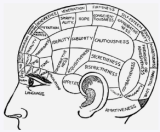
Philosophy of mind
Overview
Philosophy
Philosophy is the study of general and fundamental problems, such as those connected with existence, knowledge, values, reason, mind, and language. Philosophy is distinguished from other ways of addressing such problems by its critical, generally systematic approach and its reliance on rational...
that studies the nature of the mind
Mind
The concept of mind is understood in many different ways by many different traditions, ranging from panpsychism and animism to traditional and organized religious views, as well as secular and materialist philosophies. Most agree that minds are constituted by conscious experience and intelligent...
, mental event
Mental event
A mental event is a particular occurrence of something going on in the mind or mind substitute. It can be a thought, a dream, a feeling, a realization, or any other mental activity. Mental events are not limited to human thought but can be associated with animal and artificial intelligence as...
s, mental function
Mental function
Mental processes, mental functions and cognitive processes are terms often used interchangeably to mean such functions or processes as perception, introspection, memory, creativity, imagination, conception, belief, reasoning, volition, and emotion—in...
s, mental properties
Mental property
A mental property or a mind property is a property of a/the mind. Mental properties are studied by many sciences and parasciences. Some of these sciences are: psychology, cognitive sciences and recently also systemics....
, consciousness
Consciousness
Consciousness is a term that refers to the relationship between the mind and the world with which it interacts. It has been defined as: subjectivity, awareness, the ability to experience or to feel, wakefulness, having a sense of selfhood, and the executive control system of the mind...
and their relationship to the physical body, particularly the brain. The mind-body problem, i.e. the relationship of the mind to the body, is commonly seen as the central issue in philosophy of mind, although there are other issues concerning the nature of the mind that do not involve its relation to the physical body.
Dualism
Dualism (philosophy of mind)
In philosophy of mind, dualism is a set of views about the relationship between mind and matter, which begins with the claim that mental phenomena are, in some respects, non-physical....
and monism
Monism
Monism is any philosophical view which holds that there is unity in a given field of inquiry. Accordingly, some philosophers may hold that the universe is one rather than dualistic or pluralistic...
are the two major schools of thought that attempt to resolve the mind-body problem.
Unanswered Questions
Discussions

